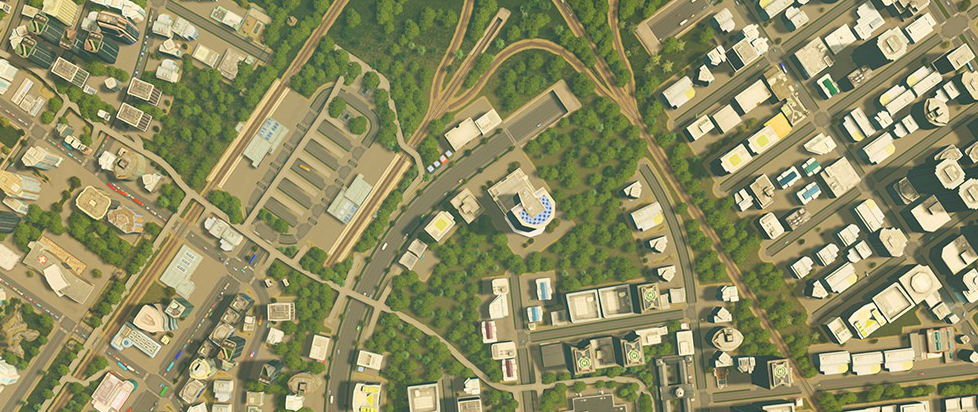
Hidden Assumptions

This column is a reprint from Unwinnable Monthly #165. If you like what you see, grab the magazine for less than ten dollars, or subscribe and get all future magazines for half price.
———
Architecture and games.
———
This should come as no particular surprise, but videogames are frequently filled with hidden assumptions about how the world works. In terms of genre, city builders for example commonly contain a capitalist mode of thought, reflecting a particular type of political economy in their mechanics. Players mostly accept this perspective without criticism, but every once in a while, a game comes along that calls things into question.
Cities: Skylines and Workers and Resources: Soviet Republic are two popular city builders which offer the opportunity to construct and manage a society. These games provide unique experiences in urban planning and resource management while representing completely different political economies. Cities: Skylines embodies a capitalist economic system in which players are given the freedom to allocate resources based on market demands and budget constraints. The game places a strong emphasis on private ownership and entrepreneurship. You can establish various industries, construct residential or commercial zones and manage taxes or balance budgets to generate revenue. The allocation of resources in Cities: Skylines is primarily driven by supply and demand with the aim of maximizing profits and ensuring economic growth. Players need to carefully analyze the needs of their city and make strategic decisions to meet those needs while keeping a close eye on the most important economic indicators. Workers and Resources: Soviet Republic on the other hand simulates a planned socialist economy. The game places you in control of a centralized system in which resources are managed by the state. Players carefully allocate resources to industries like mining, agriculture and manufacturing in order to meet the needs of their population. The focus of the game is on maintaining a balanced production chain where each industry depends on various others for their inputs. The allocation of materials in Workers and Resources: Soviet Republic is more about meeting the basic needs of the people and ensuring a smooth functioning of the economy rather than maximizing profit or catering to market demands.

Cities: Skylines represents a market driven economic system in which the forces of supply and demand largely determine the price of goods and services. The game allows players to set taxes, impose regulation and set policies which influence economic growth and development. The profit motive plays a significant role in decision making, encouraging players to attract more business, increase trade and promote development. The game scrupulously avoids delving too deeply into income inequality or the social consequences of capitalism, focusing more on the mechanics of urban planning and infrastructure management. When it comes to Workers and Resources: Soviet Republic, the game simulates a centrally planned economy, emphasizing the coordination of production and infrastructure to meet the needs of the resident population. Players handle industrial complexes, transport networks and manage resource extraction to ensure the smooth functioning of the economy. The focus is on balancing the supply and demand of goods and services through careful planning and optimization. In this particular system, the welfare and satisfaction of workers are prioritized over individual profits in accordance with established socialist thought. The game captures the complexities of a planned economy including resource allocation, production targets and of course the needs of the people.
Resident satisfaction is primarily driven by the provision of essential services and amenities in Cities: Skylines. You must ensure the availability of healthcare, education, public transportation and recreational facilities in order to maintain a happy and productive population. Doing so is crucial for attracting residents and businesses, fostering economic growth and expanding your city. The game provides a variety of different feedback mechanisms like indicators of citizen happiness and the ability to address critical concerns and issues, allowing you to gauge and improve the wellbeing of your populace. Workers and Resources: Soviet Republic also places emphasis on citizen satisfaction, but within the context of a planned socialist economy. Players need to provide adequate housing, employment opportunities and basic amenities to ensure the happiness of their population. The game introduces factors such as worker morale and job security, reflecting the importance of social cohesion and the collective welfare of citizens within a socialist economy. Players must balance the allocation of resources to meet the needs of the people while maintaining the efficiency of a planned economy, as failure to provide adequate resources can lead to dissatisfaction, lower productivity and ultimately protests or even strikes.

Cities: Skylines offers players an open ended and flexible experience, encouraging creativity and strategic decision making in the context of urban planning and infrastructure development. The focus on a market driven economy allows players to experiment with various fiscal policies and growth strategies, choosing for example to specialize in specific industries, create a diverse economy or attract investments and tourism. The game provides a sense of entrepreneurial freedom as players have the ability to shape their cities according to their own personal vision. Workers and Resources: Soviet Republic however provides you with a more structured and challenging style of gameplay. Players have to exercise careful planning and management of resources to ensure the efficient functioning of their economy. They need to consider the interdependencies between industries and make strategic decisions to avoid bottlenecks and resource shortages. The focus on meeting the basic needs of the populace and maintaining social cohesion adds a layer of complexity to the gameplay which is largely lacking in Cities: Skylines. The wellbeing and satisfaction of workers must be considered in order to maintain a stable and productive workforce. The game provides a deep and detailed simulation of a planned economy, allowing you to immerse yourself into the intricacies of resource management and economic planning.
Cities: Skylines often attracts criticism for its simplified portrayal of capitalism, focusing primarily on urban planning and infrastructure management. The game avoids diving into the details of things like income inequality, personal mobility and the broader social or political implications of capitalism. The mechanics fail to fully capture the challenges of sustainable development or the problems associated with rapid urbanization. In much the same way, Workers and Resources: Soviet Republic tends to overlook the potential inefficiencies and lack of innovation often associated with planned economies. What bears noting is that both games are filled with hidden assumptions and only by comparing and contrasting their mechanics can players gain some insight into the complexities and nuances of the two very different economic systems which they represent. The nature of a hidden assumption is of course that you have to fully recognize and understand the problem in order to properly pick it apart.
———
Justin Reeve is an archaeologist specializing in architecture, urbanism and spatial theory, but he can frequently be found writing about videogames, too. You can follow him on Twitter @JustinAndyReeve.




